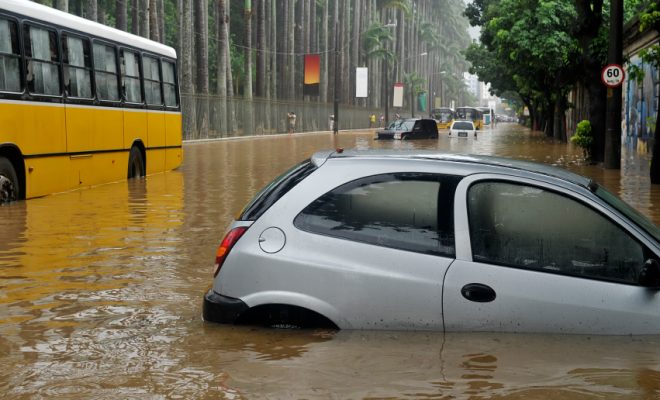Prepping for the unexpected: What to do before, during and after a sudden disaster

(Natural News) Every year, natural disasters kill around 90,000 people and affect nearly 160 million more worldwide. Just a few days ago, the Taal volcano in the Philippines blew out clouds of volcanic ash over 62 miles north, covering much of the island of Luzon, including the capital city of Manila, in a thin layer of ash. In the same vein, a series of massive earthquakes have been ravaging Puerto Rico since late December. Satellite images have even shown that the territory’s landscape has changed.
While overall, disaster preparedness is getting better, there’s still a ways to go. Here are some of the things you can do before, during and after a sudden disaster that may save your life. (h/t to ApartmentPrepper.com)
Before the disaster
The first thing you must do is beef up your supplies. Your emergency supply kit must be enough to sustain each person in your group for three days. This means having at least three gallons of water per person (one gallon a day). For food, you should have enough non-perishable goods that everyone in your group will be able to consume around 2,000 calories per person per day. Make sure to keep a good variety of nutritious foods in stock – proper nutrition will be all the more important when preparing for a disaster. Some long-lasting vegetables, fruits and grains along with naturally preserved meats will keep your diet balanced and healthy.
Some rudimentary first aid supplies are also necessary. This means bandages, creams or ointments, splints and a suture kit. Many preparedness stores sell first aid kits that will have most, if not all, of the essentials you need. Make sure to consider the needs of the most vulnerable members of your family or group as well, such as infants, the elderly and pets, who may need special items like diapers, a walker and dog food. Don’t forget to bring emergency blankets, flashlights, a multi-tool, a knife and a means of keeping yourself updated to the news such as a radio.
Consider the disaster you may be facing and prepare safety items specifically for it. If you live in a flood-prone area, buy some rain boots. If you live close to an active volcano, prepare protective eye wear and respirators.
Lastly, prepare your evacuation plans. What is your mode of transportation; how much gas will you need; which roads are you going to take; and where are you going? These are the important questions you must answer when planning your evacuation. If you’re living in a disaster-prone area, your local government may have evacuation plans already in place. Ask them for a copy of these plans and prepare accordingly.
During a disaster
For many disasters, staying home is a good choice. However, your individual circumstances can make staying home impossible. If you plan to bug out, secure your home before you leave. Anything outside that can be stolen or swept away must be brought inside, unplug all your electronic devices and appliances such as computers, WiFi routers and even refrigerators. Lock all your doors and windows and turn off your water valves and propane tanks.
Before you leave, double check everything in your emergency kit to make sure you don’t run out of gas, food or medical supplies. Leave a note on your kitchen table or somewhere conspicuous providing some basic details about your evacuation: the time you left; who’s with you; and where you’re heading. That way, if something happens, people you know will be able to find you.
Lastly, don’t forget about your pets. Their safety is just as important as your family’s. Pets should be evacuated with you and their specific plans must be arranged, such as where they’re staying, how much food they’ll need and if they need any special medication.
If you decide to stay home, make sure you’re well-stocked with food and supplies to last until either the disaster is over or until rescue teams reach you.
After the disaster
Once the worst is over, your health as well as your family’s should be your first priority. Provide them with all the medical attention they need. If necessary, contact neighbors and local responders for assistance.
If you evacuated, head back home once the local officials give their approval. If the disaster affected your home’s foundations, take a tour around the house before letting your family in to make sure it’s all safe, and proceed with caution until you can hire someone who can inspect the house more thoroughly for you.
Prepare yourself mentally when you arrive back home. When the disaster ends, you might start experiencing depression, having panic or anxiety attacks or even post-traumatic stress disorder due to the heavy nature of what you and your family just went through. Reach out to friends and loved ones and seek mental health assistance immediately. (Related: 11 Ways to maintain your mental composure during a crisis.)
The best thing you can do in the face of a disaster is to prepare for it. Be it a hurricane, earthquake or a volcanic eruption. This means not just crafting an emergency plan, but practicing it. Run through your whole plan with your family at least once a year. Figure out if your evacuation routes are still viable, check to see if emergency phone numbers are still up to date and make sure to rotate your food, water and medical supplies to avoid ending up with stale or spoiled supplies. Without practice, all that preparation will amount to nothing. But with proper planning, you may make it out of any disaster better off than most.








